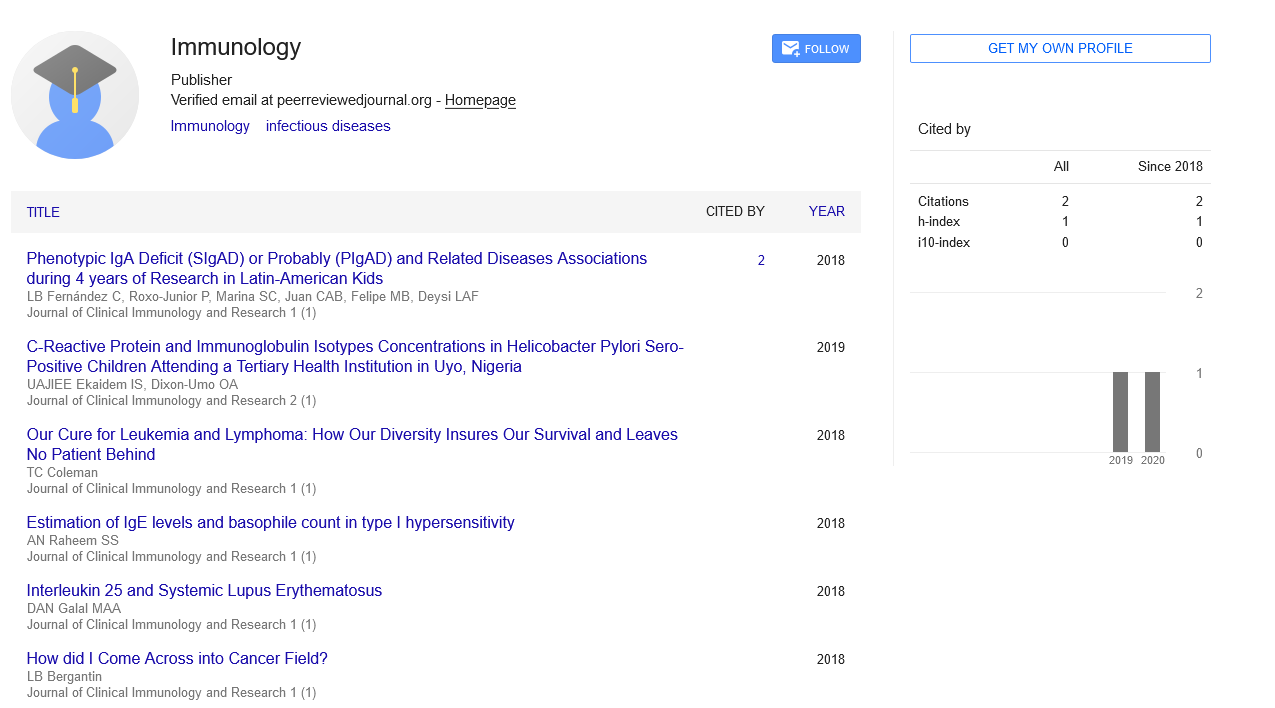Perspective, J Clin Immunol Res Vol: 8 Issue: 1
Immunogenetics: Unraveling the Genetic Basis of Immune Responses
Catherine Burgers*
Department of Pathology, University of Cape Town, Cape Town, South Africa
*Corresponding Author:Catherine Burgers
Department of Pathology, University of Cape Town, Cape Town, South Africa
E-mail:cr.burgers @uct.ac.za
Received date: 27 December, 2023, Manuscript No. JCIR-23-123665;
Editor assigned date: 29 December, 2023, PreQC No. JCIR-23-123665 (PQ);
Reviewed date: 12 January, 2024, QC No. JCIR-23-123665;
Revised date: 19 February, 2025, Manuscript No. JCIR-23-123665 (R);
Published date: 26 February, 2025, DOI: 10.4172/JCIR.1000094
Citation: Burgers C (2025) Immunogenetics: Unraveling the Genetic Basis of Immune Responses. J Clin Immunol Res 8:1.
Abstract
Immunogenetics, a burgeoning field at the intersection of immunology and genetics, explores the genetic factors influencing the complex and dynamic immune system. This manuscript delves into the intricate world of immunogenetics, unraveling the genetic underpinnings that govern immune responses. From the identification of key genetic components to their role in health and disease, this comprehensive review sheds light on the current state of knowledge and the promising avenues for future research
Keywords: Immunogenetics, Complex, Dynamic, Function, Regulation
Introduction
Definition of immunogenetics: Immunogenetics is the study of the genetic basis of immune responses. It encompasses the genetic factors that influence the development, function, and regulation of the immune system.
Importance of immunogenetics: Understanding the genetic determinants of immune responses is essential for unraveling the complexities of immune-related diseases, designing targeted therapies, and advancing personalized medicine.
Description
Major genetic components of the immune system
Human Leukocyte Antigen (HLA) system: The HLA system, a key player in immunogenetics, encodes proteins crucial for immune recognition. Variations in HLA genes contribute to individual differences in immune responses and susceptibility to autoimmune diseases.
Immunoglobulin genes: Immunoglobulin genes, responsible for encoding antibodies, exhibit remarkable diversity. Genetic variations in immunoglobulin genes influence antibody specificity and play a pivotal role in adaptive immunity.
Cytokine genes: Cytokines are signaling molecules that orchestrate immune responses. Genetic polymorphisms in cytokine genes can impact immune function, contributing to susceptibility or resistance to infectious and autoimmune diseases.
Genetic basis of autoimmune diseases
HLA associations: Many autoimmune diseases, such as rheumatoid arthritis and type 1 diabetes, show strong associations with specific HLA alleles. Unraveling these associations provides insights into disease etiology and potential therapeutic targets.
Non-HLA genetic factors: Beyond HLA, non-HLA genetic factors contribute to the genetic architecture of autoimmune diseases. Genome-Wide Association Studies (GWAS) have identified numerous susceptibility loci, revealing the polygenic nature of these disorders.
Immunogenetics in infectious diseases
Host genetic factors in infection susceptibility: Genetic variations influence individual susceptibility to infectious diseases. The study of immunogenetics provides valuable insights into host-pathogen interactions and the development of protective or predisposing immune responses.
Viral immune evasion and host genetic determinants: Viruses employ various strategies to evade the host immune response. Host genetic factors play a critical role in determining the effectiveness of antiviral immune responses, impacting both susceptibility and outcomes of viral infections.
Cancer immunogenetics
Tumor antigens and immune surveillance: Cancer cells often evade immune surveillance through mechanisms such as downregulation of tumor antigens. Genetic factors influencing the recognition of tumor antigens by the immune system are crucial for understanding cancer immunology.
Immunotherapy and genetic biomarkers: The era of cancer immunotherapy has brought forth the importance of genetic biomarkers in predicting treatment responses. Immunogenetic profiling holds promise for identifying patients likely to benefit from immunotherapeutic interventions.
Future directions and challenges
Advances in genomic technologies: Technological advancements, including single-cell genomics and CRISPR-based approaches, are poised to accelerate our understanding of immunogenetics, enabling a more precise characterization of immune responses at the genetic level.
Integration with omics data: Integrating immunogenetic data with other omics data, such as transcriptomics and proteomics, will provide a comprehensive view of the molecular mechanisms underlying immune responses and associated diseases.
Ethical considerations: As immunogenetics progresses, ethical considerations surrounding genetic testing, data privacy, and potential implications for personalized medicine need careful attention to ensure responsible and equitable use of this knowledge.
Conclusion
Immunogenetics stands as a dynamic and evolving field that holds the key to unlocking the genetic basis of immune responses. From autoimmune diseases to infectious challenges and cancer, the genetic landscape of the immune system offers unprecedented opportunities for therapeutic interventions and personalized medicine. As research continues to unveil the complexities of immunogenetics, the potential for transformative advancements in our understanding of health and disease remains vast.
 Spanish
Spanish  Chinese
Chinese  Russian
Russian  German
German  French
French  Japanese
Japanese  Portuguese
Portuguese  Hindi
Hindi 